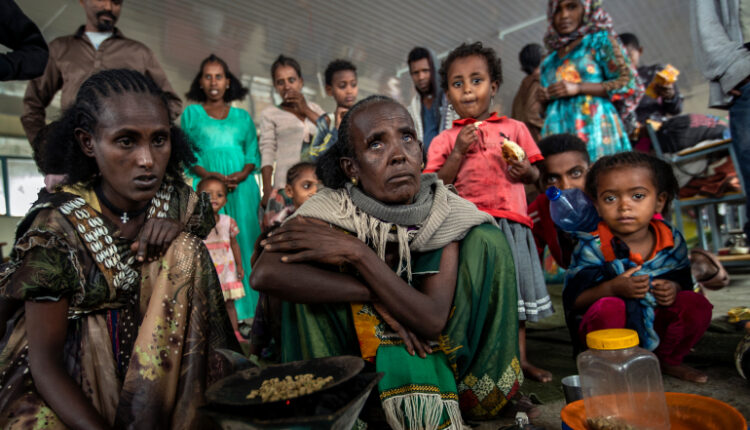
Tigray mothers share shocking accounts of dire famine conditions
Eighteen-month-old Haftom Hailay is too weak to cry. All the boy, weighing three kilogrammes, can do is sigh in pain. His mother, malnourished herself, has no milk to breastfeed him.
Where they came from in Aragure, a village east of Mekelle, the capital Ethiopia’s embattled Tigray region, the need for food is desperate.
“One month ago, everything ran out,” Haftom’s mother, Girmanesh Meles, 30 told Al Jazeera.
More than 10 months into the conflict, the famine-like conditions, which up until early July were limited to rural areas of Tigray, have now reached the outskirts of Mekelle.
“It became normal to spend four days eating nothing,” said Girmanesh, who like others tried to survive by eating sparingly whatever crops her relatives from Mekelle could donate.
“I waited for two weeks in the village … hoping someone would help,” she added. “But no was able to help. Everyone was like us.”
Worried about her son’s wellbeing, Girmanesh on September 11 embarked on foot from Aragure to bring Haftom to Tigray’s flagship Ayder Referral Hospital in Mekelle.
“My relatives told me to stay in the village, that there is nothing the hospital can do,” said Girmanesh. “[But] watching my boy getting weaker each day, I could not sit and wait until he dies in my hands.”
During the past two months, the main hospital in Mekelle has received 60 children with severe acute malnutrition. Of those 60, six have died, according to Dr Abrha Gebregzabher, a paediatrician supervising the treatment of malnourished children at Ayder hospital.

‘De facto humanitarian blockade’
Ethiopia’s Prime Minister Abiy Ahmed in November 2020 launched a military offensive to remove the governing party of Tigray, the Tigray People’s Liberation Front, accusing it of attacking federal forces. The continuing conflict has killed thousands of people and displaced more than two million – and more recently, has expanded to the neighbouring regions of Amhara and Afar.
Communications have been cut off across Tigray since June 29, when Tigrayan fighters retook most of the region. However, Al Jazeera managed to contact people in Mekelle and gather exclusive footage showing the extent of the humanitarian crisis. Interviews with 12 people in the city – including first-hand testimonies of parents currently caring for severely malnourished children, doctors, nurses, internally displaced people (IDPs) and residents trying to survive by begging for food – as well as videos and images taken from inside Ayder hospital suggest the dire humanitarian conditions are worsening.
In one image, a small emaciated boy is crying, a feeding tube going into his nose, his skeletal feet covered in wounds. The others show similar scenes.
According to the United Nations, more than 400,000 people are facing famine-like conditions and 1.8 million are on the brink of famine across Tigray. The region of some six million people remains under a “de facto humanitarian blockade”, the UN said earlier this month, warning of a “looming catastrophe” and urging all warring sides to allow and facilitate the unimpeded passage of aid.
The September 2 statement by Grant Leaity, the UN’s acting humanitarian coordinator for Ethiopia, said a minimum of 100 trucks of food, non-food items and fuel must enter the region every day – but access has been extremely difficult. “Stocks of relief aid, cash and fuel are running very low or are completely depleted. Food stocks already ran out on 20 August,” it added.
Separately, the World Food Programme said last week that, since July 12, 445 contracted non-agency trucks have entered Tigray, but only 38 have returned, calling their disappearance “the primary impediment” to stepping up humanitarian response.
Ethiopian authorities and Tigrayan officials have traded the blame for the blocking of aid convoys attempting to enter Tigray. According to the United States officials, less than 10 percent of needed humanitarian supplies reached Tigray over the past month due to obstruction of aid access.
In Mekelle, people interviewed by Al Jazeera said the deteriorating humanitarian situation was due to the blockade following the withdrawal of federal troops from the city in late June.
“Up until the siege, we were in a relatively better condition because the residents of Mekelle used to bring us food,” said Tesfay Gebretsadik, who fled to the capital from Humera, in western Tigray. “After the siege, all donations stopped. The inflation, and everything gets heavy. Residents are focused on saving their own life.”
Al Jazeera reached out to the spokesperson of the Ethiopian prime minister’s office, Billene Seyoum, for a comment but did not receive a response by the time of publication.


